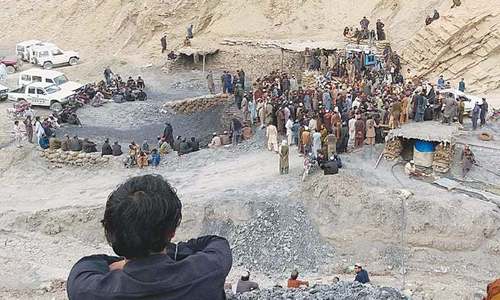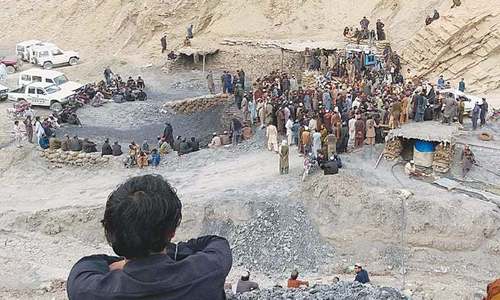PESHAWAR: The Khyber Pakhtunkhwa Mines Safety, Inspection and Regulation Act, 2019, meant to promote and improve protection of mineworkers operating in risky conditions was passed by the provincial assembly on Friday without addressing major concerns of the workers’ associations.
“The department neither sought our input nor shared the draft bill with us before laying it in the assembly,” Coal Mine Workers Welfare Association general secretary Abid Yaar said, adding that major demands of workers, including compensation for the deceased and increase in wages, were ignored in the new law.
Stakeholders say the government was under pressure to legislate following a series of incidents in the coalmines of Balochistan and Khyber Pakhtunkhwa that led to the death of dozens of workers in the last few years.
Abid Yaar said a total of 86 people of Shangla district had died in coal mine incidents since Jan 2019.
He said 85 per cent population of Shangla District was attached with mining sector.
Act ignores demand of better wages, compensation for deceased, insist labour leaders
The association leader said workers were working in deplorable condition in mines, especially in coal ones.
The new act was drafted to consolidate and amend the law relating to the safety and mining operations and the inspection and regulation of mines, mining operations and materials used therein; to promote and improve the safety and health of persons working in mines and for purposes connected therewith and ancillary thereto.
The law was passed following the 18th Constitution Amendment under which several subjects were devolved from the centre to provinces.
The law protects the rights of women, who have been barred from working below the ground in mines.
Under Section 46(1) of the new law, no woman shall be employed in any part of a mine which is below ground. Also, no woman shall be allowed to work in a mine above the ground between 7pm and 6am.
The law says no owner or mine manager shall knowingly employ a woman or no woman shall engage herself in employment in any mine during six months following the day on which she has delivered of a child.
“If any woman employed in a mine who is pregnant gives notice either orally or in writing in the prescribed form to the mine manager that she expects to be delivered of a child within one and half month from the date of such notice, the mine manager shall permit her if she desires to absent herself from work to the day of her delivery and such absence shall be treated as a period of authorised absence on leave.
Section 51(1) of the law says after the enforcement of the law, no person below 18 or above 60 years of age other than those employed in managerial or supervisory categories shall be allowed to work in any mine or any part thereof either below or above ground, where any operation connected with or accidental to any mining operation is being carried on.
The people working below or above the ground in mines will be properly registered and have been entitled annual leave with wages.
Every person who has completed one year of continuous service commencing from the first of January in a mine shall be allowed during the subsequent period of 12 months leave with wages for a number of days.
The people employed in a mine shall be allowed, with wages such festival holidays as are declared by the government to be public holidays in addition workers have been entitled casual leave and sick leave, according to the act.
The law also suggests proper working hours and days for mines.
It says no person shall be allowed to work in a mine for more than six days a week.
Similarly, a worker shall not be allowed to work above ground in a mine for more than eight hours in any day including rest interval of one hour.
Basic facilities like conservancy, canteens, shelters, mine office and medical appliances will be provided at every mine.
Section 37(1) of the law reads: “every person who performs work in or about the mine whether above or below ground shall be medically examined at such intervals as may be determined by the chief inspector.”
It says no person shall be allowed to enter into a mine for the purpose of work or employment in a mine unless he is in possession of medical fitness certificate issued by the medical practitioner.
When contacted, Pakistan Central Mine Labour Federation chairman Ra-Saeed Khattak expressed dissatisfaction with the new law and said workers and labour associations weren’t consulted by the government on it.
“The issues of mineworkers cannot be resolved unless the government ratifies 176 Convention of International Labour Organisation,” he said.
Mr Khattak claimed that Pakistan was under pressure to ratify the convention and the government should ensure the implementation of the laws.
Published in Dawn, December 29th, 2019















































Dear visitor, the comments section is undergoing an overhaul and will return soon.